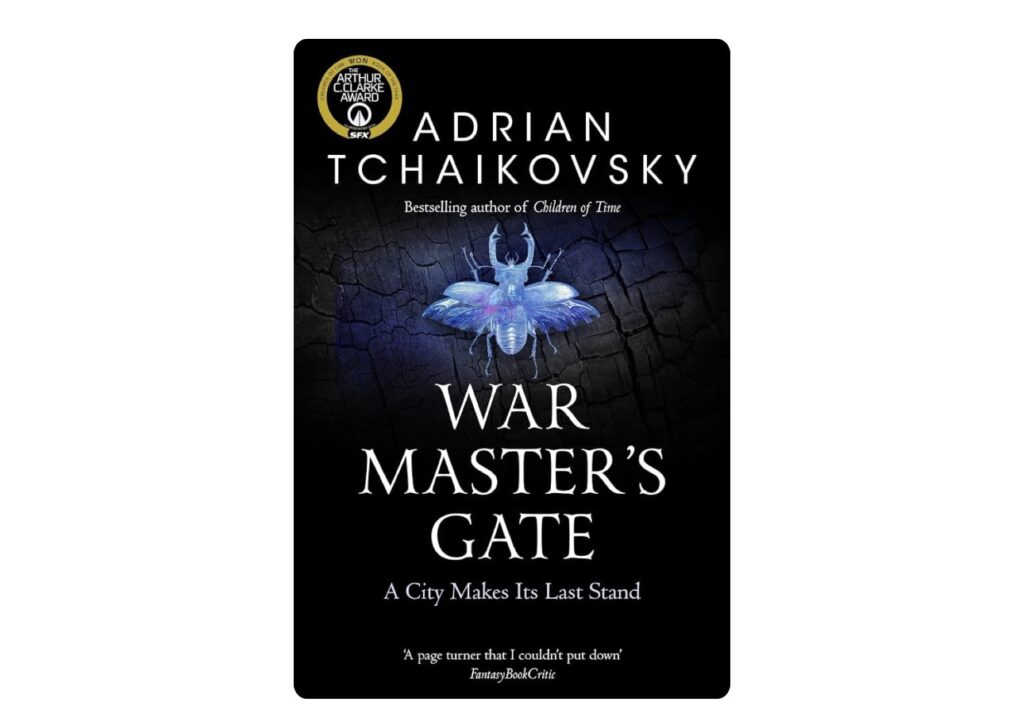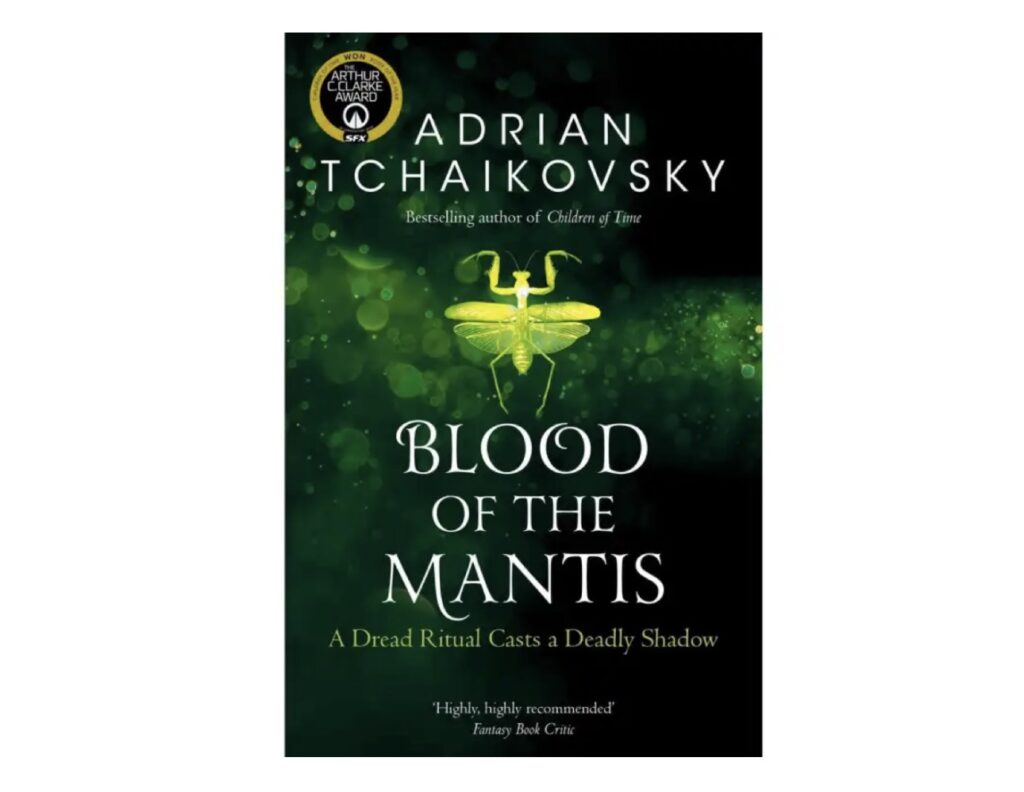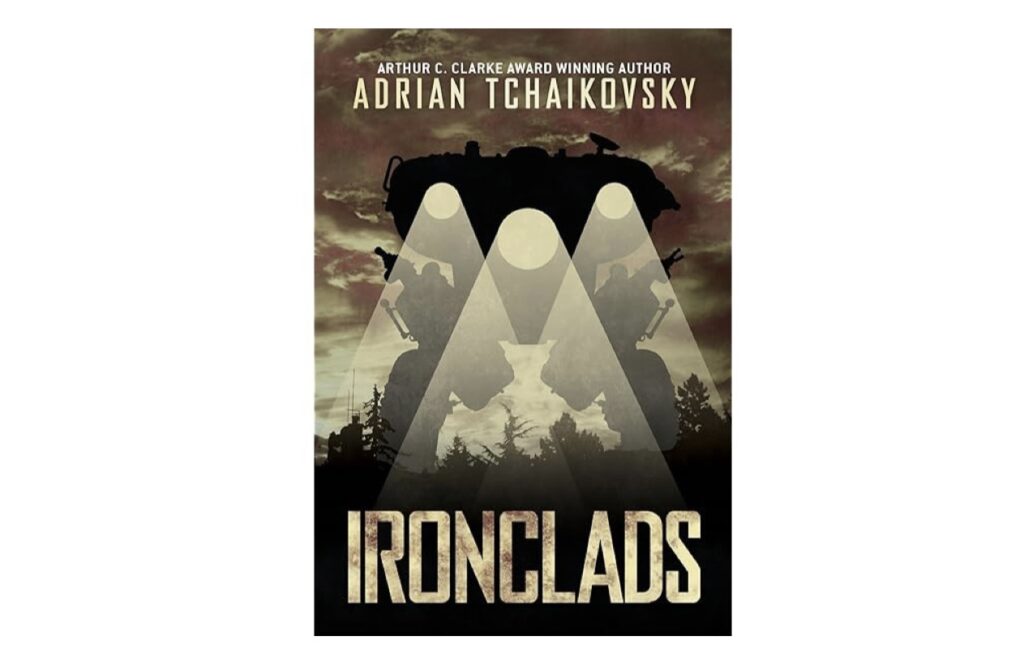In a quest to determine the crème de la crème of Adrian Tchaikovsky’s literary works, an extensive analysis was conducted. This involved delving into Tchaikovsky’s entire collection of published works. By comparing and contrasting these works, the goal was to uncover which of his creations stood tallest in the realm of literature.
A Methodical Approach to Literary Ranking
This exploration was not a mere subjective opinion. Instead, it was grounded in data, drawing insights from a trio of respected literary platforms: Goodreads, Amazon, and LibraryThing. Each book by Tchaikovsky was scrutinized under the lens of these platforms’ ratings, creating a competitive landscape where each title vied for the top spot. The books were then meticulously arranged in a list, their positions determined by the aggregate of their scores across these platforms. This method, while not strictly scientific, offers a unique perspective on the relative standing of Tchaikovsky’s works.
Understanding the Rankings
It’s important to note that this ranking system is not an absolute measure of a book’s worth. Literature, by its very nature, is subjective and diverse. The term ‘best’ is relative here – it’s less about a book being superior and more about how different books resonate with different audiences. Nevertheless, this ranking serves as a fascinating guide, especially for those new to Adrian Tchaikovsky’s world. It offers a starting point, suggesting which of his books might be most engaging to begin with.
Note for Readers
At the bottom of the page, readers will find a comprehensive ranking chart, detailing the positions of each book in this literary showdown. As you embark on this scrolling journey, it’s a chance to see where fan favorites have landed and perhaps discover a hidden gem in Tchaikovsky’s bibliography. Happy scrolling, and may this exploration enrich your reading experience!
The Top Book’s Of Adrian Tchaikovsky
This exploration presents a ranked journey through Adrian Tchaikovsky’s compelling literary works, based on collective reviews from Goodreads, Amazon, and LibraryThing. The list offers insights into his diverse storytelling prowess, starting from the most acclaimed to the less recognized yet equally intriguing titles.
1. Dogs of War: A Tale of War and Consciousness
At the pinnacle of Tchaikovsky’s works is “Dogs of War.” This novel portrays Rex, a genetically modified, weapon-laden canine deeply embroiled in warfare. The narrative delves into themes of morality, loyalty, and the essence of being ‘good’ amidst the chaos of conflict, presenting profound questions about the nature of sentient beings in war.
2. War Master’s Gate: A Battle for Survival
“War Master’s Gate,” part of the “Shadows of the Apt” series, is an engrossing fantasy novel set in a world where humans have insect-like attributes. The protagonist, Stenwold Maker, is a seasoned strategist and leader, deeply involved in the ongoing conflict against the Wasp Empire. As the Empire besieges the city of Collegium, Stenwold faces the daunting task of organizing a defense while grappling with internal political struggles and the challenges of mentoring young, promising leaders. This novel delves into themes of sacrifice, loyalty, and the moral complexities of war. The Wasp Empire is portrayed as a formidable force with advanced warfare technologies, creating a tense, high-stakes environment. The narrative intertwines multiple perspectives, adding depth to the richly crafted world. The book features intense battle scenes, intricate political maneuvers, and explores the impact of war on individuals and societies. “War Master’s Gate” stands out for its detailed world-building, well-developed characters, and the author’s skill in weaving a complex, engaging story.

3. Children of Time: Humanity’s Struggle on a New World
“Children of Time,” a science fiction masterpiece, examines the theme of survival in the vastness of space. As humanity’s last remnants search for a new home, they discover a terraformed planet, originally prepared for human habitation. However, the planet has undergone radical evolutionary changes, leading to the rise of a new, intelligent species. The novel brilliantly juxtaposes the decline of humans, clinging to the remnants of their technology and culture, against the ascent of this new species, evolving in ways beyond human understanding. This juxtaposition raises profound questions about evolution, intelligence, and what it means to be the dominant species. The narrative is rich with detailed descriptions of the planet’s ecosystem and the unique life forms that inhabit it. The author skillfully explores themes of coexistence, morality, and the consequences of playing god. With its intricate plot and thought-provoking premise, “Children of Time” challenges readers to reconsider the essence of humanity and our place in the universe.
4. Guns of the Dawn: A Story of War and Determination
“Guns of the Dawn” ranks fourth. This gripping fantasy novel juxtaposes war and magic, following Emily Marshwic as she is thrust into the front lines of a brutal conflict, compelling her to question her country’s cause and her role in the war.
5. A Time for Grief: Tales of the Insect-kinden
“A Time for Grief,” as a supplementary work to Adrian Tchaikovsky’s “Shadows of the Apt” series, is a captivating anthology that delves deeper into the intricate world of insect-kinden. This collection of stories enriches the main series by offering a mosaic of perspectives, shedding light on lesser-known characters and untold events. Each story in the book is a piece of a larger puzzle, contributing to a fuller understanding of the series’ complex world. These narratives explore themes of loss, redemption, and the resilience of the spirit in the face of adversity. The book brilliantly showcases Tchaikovsky’s ability to create emotionally resonant tales within a fantastical setting. Readers are treated to detailed explorations of the diverse cultures, politics, and social dynamics of the insect-kinden, enhancing their understanding of the main series. “A Time for Grief” is not just a collection of stories; it’s a journey through the heart and soul of the “Shadows of the Apt” world, offering fans a deeper, more intimate look at its characters and their struggles.
6. The Hyena and the Hawk: An Epic of Myth and Conflict
“The Hyena and the Hawk,” part of the “Echoes of the Fall” series, ranks sixth. It narrates the return of the Plague People and their devastating impact on the world, as heroes from different clans unite to counter this existential threat.
7. Spiderlight: A Quest Against Darkness
At number seven is “Spiderlight,” a novel centered around a prophesied group’s journey to defeat the Dark Lord Darvezian. Equipped with faith, wit, and a stolen artifact, they embark on a dangerous and transformative quest.
8. Spoils of War: A Diverse Collection of Tales
“Spoils of War,” positioned at number eight, is a remarkable anthology set in the “Shadows of the Apt” universe. This collection of short stories provides a unique blend of epic fantasy and steampunk, enriching the already vibrant world created by Adrian Tchaikovsky. Each tale in the compendium explores different facets of the series, from the front lines of battle to the intricate politics of the insect-kinden societies. These narratives not only delve into the grand events shaping the world but also focus on the individual experiences and challenges of lesser-known characters. The stories are richly detailed, offering insights into the everyday lives of the inhabitants of this universe, their struggles, hopes, and dreams. “Spoils of War” serves as a bridge, connecting various plot points and characters, and filling in gaps that the main series may not have explored in depth. It’s a treasure trove for fans, offering a deeper, more nuanced understanding of the complex world Tchaikovsky has created. The book’s fusion of fantasy and steampunk elements makes it a captivating read, showcasing the author’s versatility and creativity.
9. The Bear and the Serpent: A Saga of Power and Identity
“The Bear and the Serpent,” securing the ninth spot, continues the captivating saga of Maniye in Adrian Tchaikovsky’s enthralling fantasy series. In this installment, Maniye’s journey takes her deeper into a world riven by civil war and shadowed by ancient threats. As she grapples with her own identity, torn between different cultures and her unique heritage, Maniye becomes a pivotal figure in the unfolding political drama. The novel masterfully explores themes of self-discovery, belonging, and the heavy burden of leadership in tumultuous times. Tchaikovsky weaves a complex tapestry of alliances and enmities, where tribal loyalties and political intrigue play a significant role in shaping the fate of the characters. The narrative is enriched with vivid descriptions of diverse cultures and landscapes, adding a sense of realism to this fantastical world. “The Bear and the Serpent” is not just a tale of adventure; it’s a profound exploration of the struggles and triumphs of a young woman seeking to forge her own path in a world that is constantly changing and challenging her. This book is a testament to Tchaikovsky’s skill in creating deeply nuanced characters and intricate, engaging storylines.
10. The Sea Watch: A Story of Mystery and Intrigue
Concluding the list at number ten is “The Sea Watch.” Set against the backdrop of Collegium, this novel weaves a tale of suspense and betrayal as Stenwold Maker faces internal and external threats, pirate attacks, and looming war.
11. Blood of the Mantis: A Struggle for a Magical Artifact
“Blood of the Mantis,” ranked eleventh, is a riveting installment in Adrian Tchaikovsky’s “Shadows of the Apt” series. This book follows Achaeos in his urgent quest to retrieve the enigmatic Shadow Box in Jerez. As Achaeos navigates through danger and deception, the narrative simultaneously unveils the Empire’s preparation for a massive offensive, poised to engulf the Lowlands in war. This novel is a compelling blend of magic, espionage, and large-scale conflict, offering a multi-layered story of survival and power. Tchaikovsky skillfully interweaves personal quests with overarching political maneuvers, creating a tension-filled plot that keeps readers on the edge of their seats. The looming threat of the Empire’s dominion adds a sense of urgency and desperation to the characters’ actions. “Blood of the Mantis” stands out for its detailed world-building, intricate plot, and the seamless integration of fantastical elements with political intrigue. The book is a testament to the complexity and depth of the “Shadows of the Apt” universe, showcasing Tchaikovsky’s ability to balance individual character arcs with the broader narrative of war and survival.

12. The Air War: Espionage and Conflict
“Ranking twelfth in the series, “The Air War” is a pivotal installment in Adrian Tchaikovsky’s “Shadows of the Apt” saga. This novel portrays a world teetering on the edge of a cataclysmic war, capturing the tension and urgency of a civilization at a crossroads. In the city of Solarno, espionage and subterfuge dominate the political landscape, as factions vie for power in the shadow of looming conflict. Meanwhile, the character Myna becomes a symbol of the common people caught in the maelstrom, facing the harsh reality of war and its consequences.
The narrative is heightened by the Empress’s unwavering determination to claim her birthright, which sets a grand stage for a war of unprecedented scale in insect-kinden history. Tchaikovsky masterfully intertwines multiple storylines, from high-stakes political intrigue to the gritty realities of frontline battles. “The Air War” is remarkable for its intricate world-building, vividly bringing to life the unique qualities of the insect-kinden and their technologies. The novel delves deep into themes of power, legacy, and the cost of war, making it a compelling read that adds significant depth to the overarching narrative of the series.
13. The Private Life of Elder Things: Unveiling Ancient Mysteries
“The Private Life of Elder Things,” ranked thirteenth, is a fascinating novel that explores the mysterious intersection of the human world with ancient, alien races. This intriguing narrative brings together a diverse cast of characters, including curators, archaeologists, and mathematicians, each of whom encounters the unknown in their unique professional and personal settings.
Set against a backdrop that blends the ordinary with the extraordinary, the novel delves into the enigmatic and often unsettling encounters with these ancient beings. Tchaikovsky skillfully weaves together their stories, creating a tapestry of experiences that range from awe-inspiring to deeply unsettling. The book stands out for its ability to merge elements of science fiction, horror, and mystery, offering a fresh perspective on the interaction between humanity and otherworldly entities. The characters’ diverse backgrounds provide varied lenses through which these encounters are experienced and interpreted, adding depth and complexity to the narrative. “The Private Life of Elder Things” is a compelling read for anyone fascinated by the blend of the mundane with the fantastical, and the exploration of the unknown in our everyday lives.
14. Cage of Souls: A Dystopian Vision
“Cage of Souls,” sharing the fourteenth rank, is set in the dystopian backdrop of Shadrapar, the last city on a dying Earth. This novel paints a vivid picture of a future where humanity clings to survival in a world that has become increasingly alien and hostile. The city of Shadrapar, a remnant of former glories, is surrounded by a landscape filled with bizarre creatures and perilous environments, challenging the very essence of human existence.
Tchaikovsky masterfully creates a richly detailed world that is both fascinating and foreboding, exploring themes of decay, resilience, and the indomitable human spirit. The narrative delves into the lives of the city’s inhabitants, who navigate a complex social structure and the ever-present threat of the outside world. “Cage of Souls” is a compelling exploration of a future where humanity must adapt to survive in an unforgiving world, showcasing Tchaikovsky’s ability to craft deeply immersive and thought-provoking dystopian landscapes.
15. The Expert System’s Brother: A Sci-Fi Journey
Also holding the spot, “The Expert System’s Brother” explores the captivating story of Handry, a character unexpectedly thrust into a world far beyond his previous understanding. This science fiction narrative by Adrian Tchaikovsky delves deep into themes of identity and discovery, set against a backdrop brimming with unforeseen wonders and hidden truths.
In this novel, Handry’s journey is one of profound transformation and enlightenment, as he navigates a world that challenges his preconceptions and beliefs. The story is richly layered, exploring the complexities of a society governed by advanced, seemingly mystical technologies and the impact of these systems on individual lives and identities. Tchaikovsky’s world-building is exceptional, creating a setting that is both alien and intriguing, inviting readers to explore alongside Handry. “The Expert System’s Brother” is a testament to Tchaikovsky’s skill in weaving narratives that are not only engaging and imaginative but also deeply reflective of the human experience in confronting and adapting to new realities.
16. Children of Ruin: A Continuation of a Legacy
“Children of Ruin,” positioned at number sixteen, is a brilliant continuation of the saga that began in Adrian Tchaikovsky’s “Children of Time.” This novel expands the universe to a new world, Nod, where the remnants of ancient terraforming missions have given rise to a unique ecosystem. Humanity, along with their spider allies, embarks on a journey of discovery and faces a myriad of new challenges on this unfamiliar planet. The story masterfully intertwines the complexities of interacting with alien life forms, highlighting the theme of coexistence in a universe far vaster and more diverse than humans ever imagined.
Tchaikovsky’s narrative skillfully combines elements of science fiction and deep philosophical questions about evolution, intelligence, and the potential paths life can take. The interactions between humans and their spider allies are further explored, delving into the nuances of their inter-species relationships and communication challenges. “Children of Ruin” is not just a story of exploration and discovery; it’s a tale that examines the very nature of life and consciousness, set against the backdrop of a beautifully imagined alien world. The novel’s rich descriptions, complex characters, and thought-provoking plot make it a worthy sequel to “Children of Time,” and a standout addition to the genre of science fiction.
17. For Love of Distant Shores: Adventures of a Maverick Scientist
In the seventeenth position, “For Love of Distant Shores” narrates the adventures of Doctor Ludweg Phinagler. This series of expeditions provides a blend of adventure and scientific discovery, reminiscent of classic exploratory tales.
18. Seal of the Worm: An Epic Conclusion
“Seal of the Worm,” ranking eighteenth, marks the dramatic conclusion of Adrian Tchaikovsky’s “Shadows of the Apt” series. This final installment sees the Empire at the height of its power, but its triumph is short-lived as it encounters a new, ancient enemy. The novel masterfully portrays the devastating costs of war and the extreme measures characters are forced to take in their desperate bid to save their world.
Tchaikovsky’s storytelling reaches new heights in this book, weaving together the complex threads of the series into a compelling and satisfying finale. The narrative is replete with intense battles, political intrigue, and deep introspection. As the characters face their darkest moments, the novel explores themes of sacrifice, redemption, and the enduring spirit of resilience. “Seal of the Worm” is not just a tale of conflict; it’s a poignant examination of the impact of war on individuals and societies, and the hard choices that define heroes. The vivid portrayal of the series’ diverse and richly imagined world, combined with the depth of character development, makes this a fitting and memorable end to the epic saga.
19. The Tiger and the Wolf: A Story of War and Identity
“The Tiger and the Wolf,” ranking nineteenth, is a captivating novel set in Adrian Tchaikovsky’s enthralling fantasy universe. This story transports readers to a northern realm teetering on the brink of war, where the young protagonist, Maniye, holds a secret power that could change the course of history. Born into a world of tribal loyalties and ancient traditions, Maniye’s unique ability places her at the heart of a growing conflict that threatens to engulf the world in chaos.
Tchaikovsky crafts a rich and immersive world, where the harshness of the northern landscapes mirrors the brutal struggle for power and survival. Maniye’s journey is one of self-discovery and defiance, as she grapples with her identity and the heavy burden of her abilities. The novel is a masterful blend of myth, magic, and raw human emotion, exploring themes of freedom, destiny, and the complex nature of human (and non-human) societies. “The Tiger and the Wolf” stands out for its vivid world-building, intricate plot, and the compelling development of its central character, making it a significant addition to Tchaikovsky’s body of work and a must-read for fans of epic fantasy.
20. Dragonfly Falling: Intrigue and Warfare
Ranking twentieth, “Dragonfly Falling” continues the story from “Empire in Black and Gold.” This volume plunges into a drama of mass warfare and personal combat, as a group of heroes confronts the unstoppable force of the Wasp Empire.
21. Heirs of the Blade: A Tale of Loss and Atonement
“Heirs of the Blade,” occupying the twenty-first spot in Adrian Tchaikovsky’s “Shadows of the Apt” series, centers around the compelling character Tynisa. The novel intricately weaves her personal struggles with the larger political upheavals in the Dragonfly Commonweal. Tynisa, haunted by her past and burdened by the weight of her recent actions, finds herself navigating a complex web of emotions and responsibilities.
This installment in the series delves deeply into themes of identity, redemption, and the impact of personal choices on the broader world. Tchaikovsky’s skill in character development shines as Tynisa’s journey of self-discovery unfolds against the backdrop of political intrigue and societal change. The Dragonfly Commonweal, with its unique culture and internal conflicts, provides a rich setting for the exploration of these themes. “Heirs of the Blade” is a testament to Tchaikovsky’s ability to balance intimate character studies with grand, sweeping narratives. This novel not only advances the overarching plot of the series but also offers a deeply personal and emotionally resonant story, making it a crucial and impactful addition to the “Shadows of the Apt” series.
22. The Scent of Tears: An Expansion of the Apt Realm
At the twenty-second spot, “The Scent of Tears” takes readers back into the realm of the Apt, featured in the Shadow of the Apt series. This collection, including works from other renowned fantasy writers alongside Tchaikovsky’s own stories, enriches the existing world with new dimensions and narratives.
23. Empire in Black and Gold: A Tale of Invasion and Resistance
“Empire in Black and Gold,” holding the twenty-third position, introduces us to Stenwold and his efforts to warn Collegium of the Wasp Empire’s threat. As the Empire advances, Stenwold trains agents, including his niece and ward, to counter this formidable foe. This story merges intrigue, war, and the unique powers of various human races inspired by totem insects.
24. Ironclads: A Futuristic Battle Saga
“Ironclads,” ranking at the twenty-fourth spot, is a gripping novel by Adrian Tchaikovsky that skillfully combines science fiction with military drama. The story follows Sergeant Ted Regan on a high-stakes mission to locate a missing Scion, a member of a wealthy and influential corporate family. Despite the advanced protective technology of his Ironclad battle suit, the Scion’s disappearance is shrouded in mystery, setting the stage for a thrilling narrative.
Set in a near-future world where corporate power and advanced military technology intertwine, “Ironclads” explores the implications of privatized warfare and the widening gap between the elite and the common people. The narrative is rich in detail, painting a realistic picture of a society transformed by technological advancements and corporate dominance. Tchaikovsky’s storytelling is marked by tense action sequences, nuanced character development, and a deep exploration of themes such as the morality of war, the responsibility of power, and the human cost of technological progress. “Ironclads” stands out for its thought-provoking content and its seamless blend of futuristic technology with the gritty realities of military operations, making it a compelling read for fans of both science fiction and military fiction genres.

25. The Girl at the End of the World Book 2: Surviving the Apocalypse
“The Girl at the End of the World Book 2,” ranked twenty-fifth, throws readers into an apocalyptic world where survival is a brutal affair. This narrative captures the chaos and desperation of a world overrun by zombies and ravaged by catastrophic events.
26. Walking to Aldebaran: A Harrowing Space Adventure
“Walking to Aldebaran,” positioned at the twenty-sixth spot, is a riveting science fiction novel by Adrian Tchaikovsky. It presents the harrowing journey of astronaut Gary Rendell, who finds himself lost and isolated in an alien environment. The story is an intense and gripping account of Rendell’s struggle to survive and make sense of the mysterious and perilous depths of space.
The narrative captures the psychological and physical challenges of being stranded in an unknown and hostile environment. Tchaikovsky masterfully creates a sense of claustrophobic tension and existential dread, as Rendell navigates through alien landscapes filled with incomprehensible dangers and wonders. The novel is a blend of suspense, horror, and science fiction, exploring themes of isolation, the unknown, and the resilience of the human spirit in the face of overwhelming odds. “Walking to Aldebaran” is notable for its vivid storytelling, well-crafted suspense, and the deep exploration of the protagonist’s mental and emotional states. This book offers a unique and immersive reading experience, showcasing Tchaikovsky’s versatility as a writer and his ability to create compelling narratives in diverse science fiction landscapes.
27. Reading Between the Lines: An Unexplored Mystery
Ranking twenty-seventh, “Reading Between the Lines” remains an enigmatic addition to Tchaikovsky’s collection, with its details and thematic focus offering a mysterious allure to readers.
28. Dark Currents: A Genre-Defying Collection
“Dark Currents,” occupying the twenty-eighth rank, is an enthralling anthology that showcases the remarkable breadth of Adrian Tchaikovsky’s imagination. This collection traverses multiple genres, including science fiction, fantasy, dark fantasy, and horror, all united under the theme ‘Dark Currents.’ Each story in this compilation is a testament to Tchaikovsky’s versatility as a writer and his skill in crafting narratives across a diverse spectrum of genres.
The anthology stands out for its ability to delve into the darker and more mysterious aspects of storytelling. Tchaikovsky weaves tales that are not only compelling but also provoke thought and stir the imagination. The stories explore various dimensions of ‘Dark Currents,’ whether it be through the flow of time, the depths of the human psyche, or the undercurrents of a dystopian society. His writing inspires other writers, demonstrating the endless possibilities within the realms of speculative fiction. “Dark Currents” is more than just a collection of stories; it’s a showcase of Tchaikovsky’s talent in evoking a range of emotions and thoughts, making it a must-read for fans of any of these genres and a brilliant demonstration of his narrative prowess.
Conclusion: The Diverse Tapestry of Adrian Tchaikovsky’s Works
Adrian Tchaikovsky’s literary works, spanning from the highly acclaimed to the less recognized, form a diverse tapestry of storytelling that is both vast and intricate. His ability to seamlessly weave elements of fantasy, science fiction, horror, and speculative fiction into his narratives has established him as a versatile and imaginative author in the realm of contemporary literature.
From the fantastical realms of the “Shadows of the Apt” series to the profound depths of space in “Walking to Aldebaran,” Tchaikovsky’s stories are not just mere escapades into fictional worlds; they are profound explorations of themes such as survival, identity, conflict, and the human condition. His characters, often caught in the whirlwinds of epic struggles or personal dilemmas, reflect the complexities of real-life choices and challenges.
Tchaikovsky’s works also stand out for their unique blend of world-building and character development. He crafts universes with meticulous detail, imbuing them with a sense of realism that anchors the fantastical elements firmly in the reader’s imagination. His ability to create relatable characters, whether they are human or derived from totem insects, speaks volumes of his skill as a storyteller.
In conclusion, Adrian Tchaikovsky’s bibliography is a testament to his prowess as a writer who can not only cross genres but also blur the lines between them. Each book in his collection, regardless of its rank, is a window into a world crafted with passion and intelligence, offering readers a rich and immersive experience that lingers long after the last page is turned.



